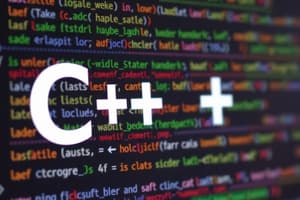Podcast
Questions and Answers
What is a string in C++?
What is a string in C++?
- A built-in data type in C++
- An integer value stored in a string
- A sequence of characters in quotes (correct)
- A single character stored in a variable
What is the difference between a string variable and an array of characters?
What is the difference between a string variable and an array of characters?
- A string variable is a built-in type, while an array of characters is a user-defined type
- A string variable is a single character, while an array of characters is a sequence of characters
- A string variable is initialized with double quotes, while an array of characters is initialized with single quotes
- A string variable is a variable that stores a sequence of characters, while an array of characters is a variable that stores a single character (correct)
What is the size of the memory allocated for a string variable?
What is the size of the memory allocated for a string variable?
- The size of the string variable is fixed, regardless of the number of characters in the string
- The size of the string variable is equal to the number of characters in the string plus one (correct)
- The size of the string variable is equal to the number of characters in the string
- The size of the string variable is determined at runtime
What is the purpose of the #include directive in relation to strings?
What is the purpose of the #include directive in relation to strings?
What is the difference between a string and an integer?
What is the difference between a string and an integer?
How many bytes are allocated for a string variable 'X6' with the value 'JADARA'?
How many bytes are allocated for a string variable 'X6' with the value 'JADARA'?
What is the output of the code 'cout << s1;' if 's1' is a string variable with the value 'AAAAA AA'?
What is the output of the code 'cout << s1;' if 's1' is a string variable with the value 'AAAAA AA'?
What is the purpose of the 'cout' statement in relation to strings?
What is the purpose of the 'cout' statement in relation to strings?
What is the difference between a string and an empty string?
What is the difference between a string and an empty string?
What is the purpose of the #include directive in relation to the C++ programming language?
What is the purpose of the #include directive in relation to the C++ programming language?
Flashcards are hidden until you start studying
Study Notes
Data Types and Declarations
- A string is a set of characters, represented as a sequence of letters in quotes.
- Examples of strings: "JADARA", "C++ is fun!", " " (empty string).
- A string variable stores a sequence of characters, and its size is variable.
- In contrast, a char variable stores a single character, and its size is 1 byte.
Declaration and Initialization of Strings
- The string type is not a built-in type in C++, so it requires the #include directive to use all its functions.
- A string can be initialized using the string keyword, e.g., string X6 = "JADARA";.
- A string can also be initialized as an array of characters, e.g., char s1[]= "AAAAA AA";.
Key Differences between string and char arrays
- A string variable is declared using the string keyword, while a char array is declared using the char keyword.
- A string variable can be initialized with a string literal, while a char array must be initialized with a character array.
- A string variable can be manipulated using string functions, while a char array must be manipulated using array operations.
Output
- The COUT statement is used to output strings and other variables to the console.
Studying That Suits You
Use AI to generate personalized quizzes and flashcards to suit your learning preferences.




